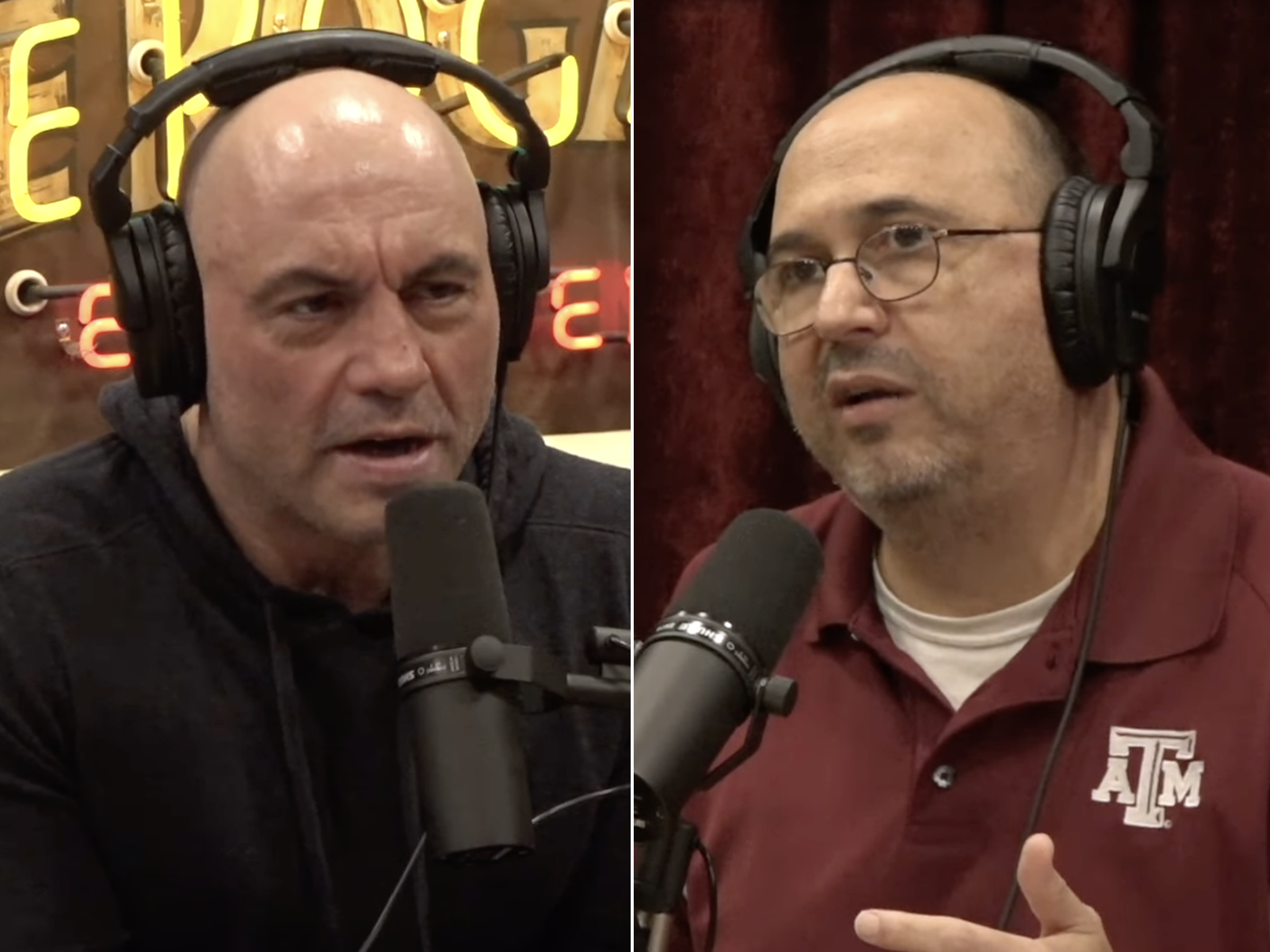Why would a climate scientist go on Joe Rogan’s sceptic-promoting podcast? ‘I agreed before I thought about it’
Andrew Dessler was well aware of how controversial Rogan’s show is but, he tells Louise Boyle, the opportunity to give millions of listeners the truth about the climate crisis was too good to miss


One minute you’re giving lectures for 10 to 20 people and the next, talking to an audience of an estimated 11 million.
Such, anyway, was the case for Andrew Dessler, a climate scientist and professor of Atmospheric Sciences at Texas A&M University, when he was invited to appear on Joe Rogan’s wildly popular podcast on Wednesday.
Dr Dessler, who has a PhD in chemistry from Harvard and has worked for Nasa, said that there wasn’t much time to ponder whether to appear on The Joe Rogan Experience, which has been the source of recent misinformation controversies over Covid-19 and climate change.
“[Joe Rogan] asked me on Sunday afternoon,” Dr Dessler toldThe Independent. “If he’d asked longer in advance, I might not have done it but the timeline was so short, I agreed before I thought about it.”
He added: “He’s very controversial, I understand that. But his audience is too large, and it was too good of an opportunity to try to get the message out about climate change. I viewed that as being the most important factor.”
In a typically lengthy episode – lasting two hours, 12 minutes – the scientist and Rogan had a wide-ranging discussion on climate change which jumped from plummeting costs of renewable energy to deadly air pollution from fossil fuels, and the efficacy of debating scientific facts.
Dr Dessler said that he was happy with the interview overall but called it one of the “most challenging” he had ever done.
“In any two-hour interview, you’re going to say things that you regret later. I shouldn’t have brought up cryptocurrency – that was a mistake,” he noted. (Dr Dessler had pointed out that cryptocurrency mining is an energy intensive process, among other remarks, which has provoked the ire of the very vocal Twitter crypto community.)
He continued: “That said, I’m cautiously optimistic that I got the message out, and that people will hear it and understand how solid climate science is, how good renewable energy is, and how bad fossil fuels are.
“And, that this is a problem we can solve – that’s really the message. It’s not a scientific or technical problem. It’s a political problem.”
Rogan has aired several episodes with guests discussing climate change since the start of the year. By some metrics, his show gets 11 million downloads per episode.
In January, Dr Jordan Peterson, a clinical psychiatrist and author who is not a climate scientist, used the platform to claim that climate science has no basis in reality, and that solar power kills more people than nuclear.
Last week, Rogan’s guest was Dr Steven Koonin, a physicist and former chief scientist for BP who served in the Obama administration. His book, Unsettled, argues the consensus on climate change is less clear than commonly thought. A review by Scientific American described the book as “making distracting, irrelevant, misguided, misleading and unqualified statements about supposed uncertainties that he thinks scientists have buried under the rug”.
(Last year a review of 90,000 academic papers on climate change found that 99.9 per cent of scientists were in agreement that humans were causing the crisis, a level of scientific certainty on par with evolution.)
Spotify, a Swedish-based, public company, has faced increased scrutiny over its responsibility for misinformation and pseudoscience on the platform, issues which have long plagued other tech giants like Facebook, YouTube and Twitter.
At the heart of the furore is Rogan, a stand-up comedian and UFC commentator, with the platform’s most popular show. Spotify paid a reported $200m for its exclusive rights, according to The New York Times.
The rock star Neil Young was the first of several high-profile musicians who asked Spotify to remove his song catalogue due to repeated Covid misinformation on Rogan’s podcast. Singer-songwriter India.Arie asked for her music to be removed due to Rogan’s “problematic language around race”.
Spotify has said that it is committed to free speech but also removed past episodes of Rogan’s show. The company’s content guidelines have also been made public, and “content advisories” would be added to Covid episodes.
On Thursday, Rogan posted to Instagram: “2 perspectives on climate change. Steven Koonin, physicist, who wrote the book “unsettled” and Andrew Dessler climate scientist and Professor of Atmospheric Sciences at Texas A&M University. Both had a completely different perspective.”
While many followers posted with praise for Rogan, one user responded: “Maybe next week you could show the different perspectives of the holocaust? Or gravity?”
On Wednesday’s show, Rogan appeared genuinely astonished by some facts provided by Dr Dessler including when he refuted Dr Koonin’s earlier claim that fossil fuels were the cheapest energy sources. The professor noted that, at times, Texas generates half its power from wind turbines. (Dr Dessler later shared data from the Texas power grid, ERCOT, on his Twitter account.)
The day after the interview aired, and following a negative barrage on social media, Dr Dessler told The Independent that a lot of people had out-of-date views on renewables.
“I don’t blame people because renewable energy is changing so fast,” he said. “Last March wind and solar were over 40 per cent of [Texas] power. To be clear, it doesn’t always generate that much power – the spring is the period where wind and solar generate the highest fraction. But still, it’s generating enormous amounts.
“People just don’t believe it because their knowledge is, for example, from 2015 when Texas didn’t have nearly as much renewable energy. And when I say wind and solar are the cheapest, maybe they’re thinking 2010, when solar was the most expensive form of energy.”
Dr Dessler also appeared to shock Rogan as he listed the myriad negative consequences of burning fossil fuels, particularly coal. He pointed out that coal kills millions of people from air pollution globally, including tens of thousands of Americans, due to the small particulate matter, called PM2.5, which buries deep into lungs, and then transfers to the blood stream. PM2.5 has been linked to cancers, heart attacks and strokes.
“It’s another impact of fossil fuels that anti-climate people leave out of their arguments,” Dr Dessler added.
Towards the end of the interview, Rogan asked the climate scientist if he would be interested in a debate with Dr Koonin.
Dr Dessler said that while he wouldn’t debate science which “has already been debated in the scientific system”, he would be “happy to debate policy”.
Rogan replied that a debate on the science would be “very beneficial” for the “average person”, to which Dr Dessler strongly disagreed.
Later, the college professor mulled over if he had made his point well, saying that he had a “lot of hate mail” on the subject.
But he remained firm, saying that it was“the goal of the fossil fuel industry to keep the idea of [scientific] debate alive”.
“For people who don’t want to take action on climate, it allows them to continue to insist there’s a debate – because you just had a debate! I still feel strongly it’s a bad idea,” he said.
Given the opportunity, Dr Dessler said he would likely accept an invitation to go on Rogan’s podcast again, to be part of helping to further understanding of the climate crisis.
“I think this one event probably reached more people than everything I've done in my entire career,” he said. “It's probably 10 or 100 times more people. I've given a lot of talks to 10 or 20 people over the years.
“I think you can't overstate the importance of taking advantage of those kind of platforms when they become available. That's really the way I look at.”




Join our commenting forum
Join thought-provoking conversations, follow other Independent readers and see their replies
Comments